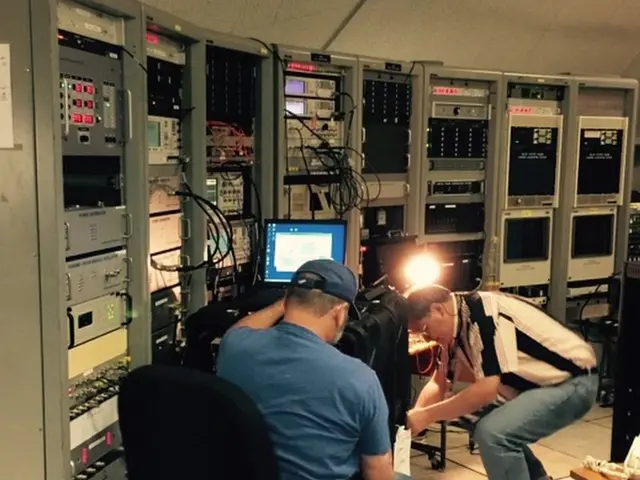Innovative Climate Technology Business Concepts to Introduce in the Year 2025
In 2025, the climate tech landscape is a goldmine for entrepreneurs and innovators. With 45% of Fortune Global 500 companies focusing on net-zero targets and the U.S. Inflation Reduction Act rolling out climate-friendly policies, the stage is set for ambitious startups. Artificial Intelligence (AI) and deep tech are driving climate innovation, drawing investor attention to solutions like AI-powered energy forecasting, climate risk modeling, and carbon tracking tools.
To succeed in this space, revolutionary thinking is necessary. Scalable technology, regulatory alignment, the right talent, and business models that integrate into existing systems are key components of successful startups. The Internet of Things (IoT), blockchain, biotechnology, and robotics are fueling smarter and more efficient climate solutions.
2024 saw global investment in energy transition break new ground, surpassing $2.1 trillion. Money poured into electrified transport, renewables, and power grid upgrades. However, funding for early-stage climate change and technology innovations, such as sustainable fuels and carbon removal, has slowed. This creates a ripe opportunity for bold, tech-driven newcomers to fill the gap, moving beyond traditional renewables.
Investors are drawn to the convergence between AI and climate technology. AI offers various solutions in the energy sector, including AI-driven grid optimization, climate modeling, and carbon tracking. Founders who harness this power stand out in both funding and market relevance. It's clear: the next wave of transformative businesses will tackle climate change head-on.
With 45% of the world's largest corporations aiming for net-zero emissions by 2050, it's your time to join the race. Here's our take on the ten most promising climate tech startup ideas for 2025:
- Renewable Energy Optimization Platforms: AI-powered platforms to optimize energy generation, distribution, and consumption from renewable sources are desirable as the world grapples with intermittent renewable energy supply.
- Carbon Capture and Utilization Solutions: Converting CO2 emissions into valuable products like synthetic fuels, concrete, or chemicals creates a pathway to reduce emissions while generating revenue.
- Sustainable Agriculture Tech: Smart technologies that reduce environmental impact through precision farming, vertical farming, and regenerative agriculture can improve crop yields and help promote sustainable food production methods.
- Circular Economy Marketplaces: Platforms that facilitate the exchange of reused or recycled materials, reducing waste and promoting sustainability could thrive as consumers become more interested in sustainable products and reduced waste.
- EV Infrastructure and Battery Recycling: Electrical vehicle (EV) infrastructure and recycling technologies for battery reuse are crucial as the electric vehicle market expands and focus sharpens on sustainable battery management.
- Water Conservation and Management Tech: Water conservation and efficient management systems, powered by IoT, can help alleviate concerns over water scarcity and increasing demand for efficient water management systems.
- Climate Risk and Sustainability Analytics: Data-driven insights to help businesses and governments assess and mitigate climate-related risks are in high demand in various sectors as awareness of climate risks heightens.
These ideas represent growing market demands and opportunities in the climate tech sector. So, gear up, entrepreneur! 2025 promises to be the breakout year for climate tech founders ready to lead the charge toward a sustainable future.
- The convergence between machine learning and climate technology encourages the development of AI-powered renewable energy optimization platforms, offering solutions for efficient energy generation, distribution, and consumption from renewable sources.
- Science and environmental-science intertwine in the quest for carbon capture and utilization solutions, where CO2 emissions are transformed into valuable products like synthetic fuels, concrete, or chemicals, enabling a pathway to reduce emissions and generate revenue.
- In the intersection of industry and renewable-energy, sustainable agriculture tech emerges, utilizing smart technologies for precision farming, vertical farming, and regenerative agriculture, enhancing crop yields and promoting sustainable food production methods.
- As finance and the environment become increasingly intertwined, circular economy marketplaces are a promising venture, facilitating the exchange of reused or recycled materials, reducing waste, and promoting sustainability among consumers.
- The electrification of transportation and the need for sustainable battery management lead the way for entrepreneurs to invest in electrical vehicle (EV) infrastructure and battery recycling technologies, as the electric vehicle market expands.
- With a growing focus on environmental-science and climate-change, water conservation and efficient management systems, powered by the Internet of Things (IoT), are crucial for alleviating concerns over water scarcity and increasing demand for efficient water management systems.
- Businesses and governments looking to assess and mitigate climate-related risks require data-driven insights from climate risk and sustainability analytics, making this sector ripe for growth and innovation.







